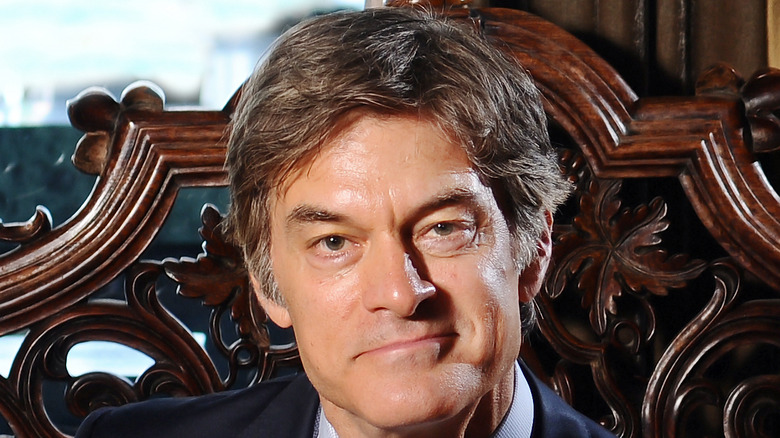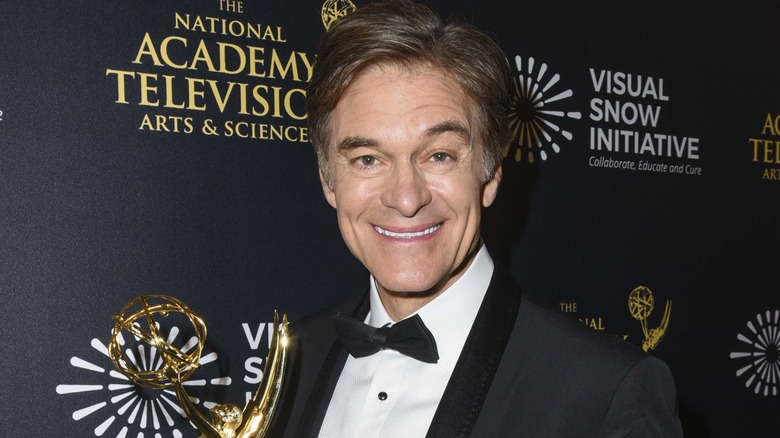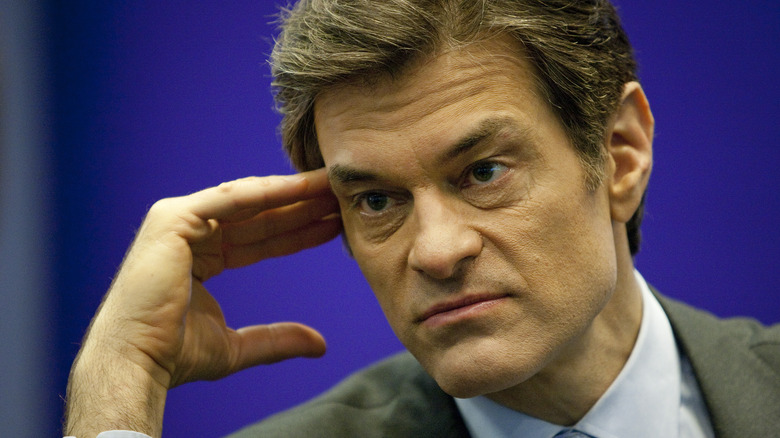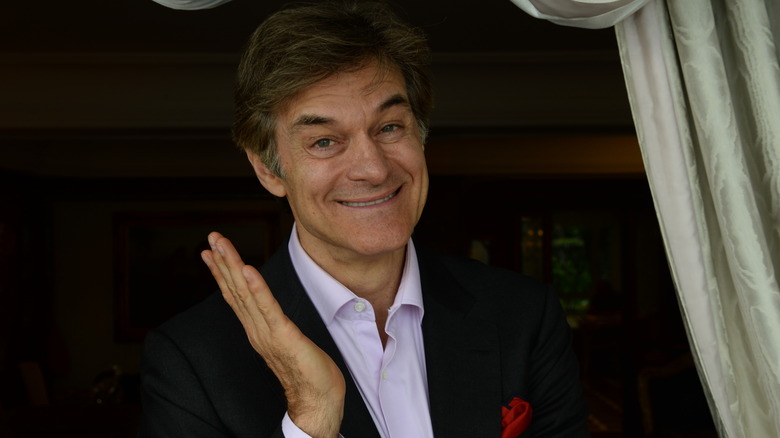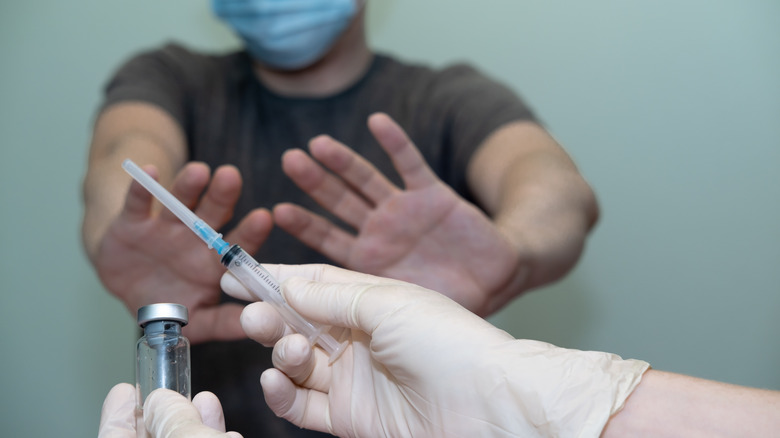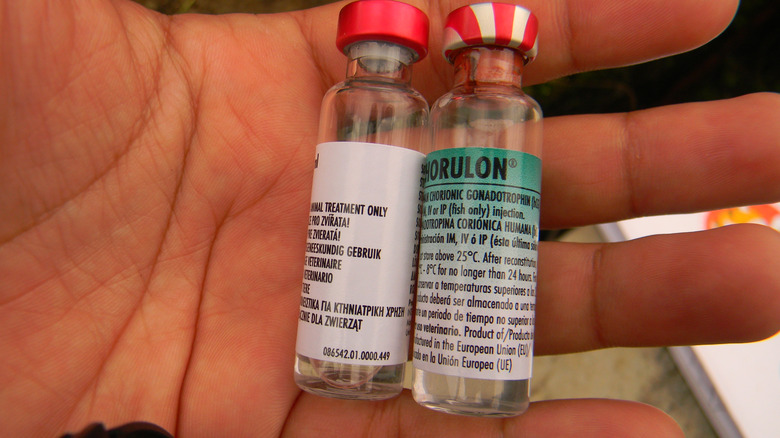Dr. Oz's Most Controversial Health Advice
The following article contains material about conversion therapy and weight loss.
Mehmet Cengiz Oz, more commonly known as Dr. Oz, is a Turkish-American doctor, author, and television personality, per Britannica. He's best known for his talk show "The Dr. Oz Show" and his "You" series of health and wellness books. Oz was raised in Delaware by his parents, both Turkish immigrants. His father was a surgeon, and according to a profile of Oz in The New Yorker, inspired Oz's career in medicine. Oz's Turkish heritage was very important to his family, and to him. They often traveled to Turkey, and Oz even served in the Turkish military so he could maintain dual citizenship. His time in Turkey also shaped his medical career. There, he was introduced to many of the holistic approaches to health that later became his hallmarks.
Oz graduated from Harvard University and went on to receive his medical degree from the University of Pennsylvania. He pursued a double major and received his M.B.A. at the same as his M.D. Oz went on to the Columbia-Presbyterian Medical Center for his medical and surgical residencies, and eventually became a surgical resident there. Oz first started experimenting with alternative medicine during his time at Columbia-Presbyterian. He began incorporating practices like reiki, acupuncture, and meditation into his treatment plans and gathering evidence as to their efficacy. Outside the operating room, Oz penned several health and wellness books aimed at integrating holistic practices into everyday life. He also gained a reputation for giving health and wellness advice that wasn't backed by scientific evidence, making some of his advice quite controversial.
The Dr. Oz Show
Years before he landed his own television show, Dr. Oz was a favorite of the queen of daytime television, Oprah Winfrey. According to a Vox profile on Oz, Winfrey began featuring Oz as a guest on her show in the early 2000s. Winfrey started calling him "America's Doctor," and the name stuck.
As The New Yorker pointed out, Oz had a preternatural talent for explaining medical issues in a simple and flashy way that caught the attention of regular people. Oz became such a popular figure on "Oprah" that Winfrey offered him his own show in 2009, and thus "The Dr. Oz Show" was born. Oz quickly became one of the most influential celebrity doctors in America. The show focused heavily on holistic medicine, offering viewers an alternative to Western medicine. Dr. Michael Argenziano, who worked with Oz at Columbia-Presbyterian, told Vox that Oz's show appealed to Americans because he taught them how to take their health into their own hands.
However, as the show went on, Oz's health and wellness advice got more sensational and less science based. He made claims about alternative treatments that weren't backed by research and presented several alternative treatments as "miraculous" secrets of health. The show became known for outrageous claims rather than sound health advice. Indeed, according to a study published in the British Medical Journal that analyzed the content of "The Dr. Oz Show," less than half of the claims Oz made on his show were supported by evidence.
The Federal Trade Commission (FTC) hearing
The ostentatious language and questionable claims Oz became famous for got him in trouble in 2014, per Politico. He was called in front of the Senate Subcommittee on Consumer Protection to testify about false advertising in the weight loss industry. The members of the Senate subcommittee questioned him about claims he'd made about diet and weight loss supplements on "The Dr. Oz Show," calling him out for using words like "miraculous" and "magic" to describe the results of featured supplements. They focused heavily on the fact that Oz did not use scientific research to back up his claims.
Oz defended himself by presenting studies that he claimed supported his statements. He insisted that his sensational language was just a part of showbiz, and also pointed out that he never sold any of the supplements he featured on his show, proving that his statements were not profit-driven. Matthew Eisenberg, an expert on health economics and policy, told Politico that Oz is very careful and intentional about how he talks on his show and in public settings like the hearings. He's very good at crafting a message that pulls in consumers and audiences while not actually saying anything outright false. Eisenberg emphasized that this is a common tactic in the diet and weight loss industry.
Oz continues to make headlines to this day for many of his outrageous claims. Let's review some of the most controversial pieces of health advice the doctor and TV personality has made over the years.
The claim: The establishment doesn't want you to know...
The majority of Dr. Oz's controversial health claims stem from one basic premise: This is the information that "the establishment" doesn't want you to know about. Oz told The New Yorker that in order to create "skeptical and smart patients" he needs to tell them "what the establishment doesn't want them to hear: that their answers are not the only answers, and their medicine is not the only medicine." Oz sees himself as using his insider knowledge of the medical systems to inform patients about all their options, not just the ones that their doctors are giving them. He does this by giving a public platform to the people offering alternatives to traditional medicine and by showcasing products that traditional doctors are unlikely to recommend.
However, sometimes this goal doesn't result in better health outcomes. Dr. Steven Charlap, a preventive medicine physician practicing in Florida, told Slate that he consistently sees his patients taking unnecessary supplements that they saw on "The Dr. Oz Show." Charlap added that some of these supplements can cause significant health problems if they're taken with other medications or supplements. Charlap emphasized that Oz is making these recommendations without any insight into the medical situations of individual people who might follow them. In his opinion, this violates the basic medical edict "do no harm."
The claim: green coffee bean extract is a miracle weight loss pill
In a May 2012 episode of "The Dr. Oz Show," Oz did a segment about a study that supposedly showed that supplements made with green coffee bean extract helped people lose weight. He featured an interview with Lindsey Duncan, a naturopath and nutritionist. However, two years later, the researchers behind the study Oz based the segment on openly admitted that they couldn't verify the data, so they voluntarily retracted it. An FTC investigation found that some of the data had been manipulated. This investigation also led to the Senate subcommittee hearings in which Dr. Oz defended his endorsement of the supplement and the other medical claims he makes on his show.
The FTC investigation also uncovered some interesting information about Oz's guest, Lindsey Duncan. According to Vox, the investigation found that he had no degrees in naturopathic medicine or nutrition. Additionally, he had no knowledge of green coffee bean extract before appearing on "The Dr. Oz Show." In fact, his company started purchasing green coffee bean supplements after he received the request to appear on the show. They also put up websites specifically for selling the supplement and bought Google advertising related to searches for green coffee bean supplements. Essentially, Duncan pretended to be an expert on the supplement in order to profit from the sales that would result from Oz promoting it on his show. The entire green coffee bean extract fiasco turned out to be a scam.
The claim: hydroxychloroquine treats COVID-19
When the coronavirus pandemic started, Dr. Oz was quick to weigh in on potential treatments for the virus. During an appearance on Fox News with Sean Hannity in March of 2020, Oz suggested that the malaria drug hydroxychloroquine could be a promising treatment for the COVID-19 virus, citing a study from China that he said had "promising" results (via YouTube). Over the next few weeks, Oz did several segments on his own show about hydroxychloroquine as a treatment for the novel coronavirus, despite the fact that there were very few studies proving that it worked at the time, according to CNN.
In a few of those segments, Oz interviewed a French doctor named Didier Raoult, who was conducting research into combining Z-Pack, Zithromax antibiotics, with hydroxychloroquine as a treatment for COVID-19. Though the treatment had only been through one clinical trial, Oz promoted it as a possible cure for the pandemic worldwide.
However, after a study conducted by the VA showed the hydroxychloroquine had no impact on COVID-19 symptoms and that the death rate was higher for those that took the drug, Dr. Oz promptly changed his stance. According to Deadline, Oz said that people should wait for more clinical research on hydroxychloroquine. He emphasized the need for solid research from the U.S., even though he'd previously touted studies from China and France. After that, Oz stayed quiet about hydroxychloroquine but continued to promote other potential treatments for coronavirus, which hadn't been extensively studied either (via YouTube).
The claim: conversion therapy works for some people
In November of 2012, Dr. Oz did an episode about LGBTQ+ conversion therapy. According to the Human Rights Campaign, conversion therapy, sometimes called "reparative therapy," is a collection of counseling practices that claims to teach people who are uncomfortable with their sexuality or gender identity how to change their sexual orientation or gender identity. It's rooted in the belief that being LGBTQ+ is abnormal and can be "cured." A study on the practice conducted by the UCLA School of Law found that conversion therapy has been discredited by almost every major psychiatric association in the country.
Dr. Oz interviewed a therapist from National Association for Research and Therapy of Homosexuality (NARTH) who supported conversion therapy. He also interviewed public figures, therapists, and representatives from LGBTQ+ advocacy groups who opposed the practice. In a blog post published the same day, Oz wrote that he felt it was important to "present multiple perspectives" in order to "reach everyone who might benefit from understanding the risks of this therapy." He also stated that he did not support the practice.
A joint statement from The Gay & Lesbian Alliance Against Defamation (GLAAD), Gay, Lesbian and Straight Education Network (GLSEN), and PFLAG issued the same day condemned Dr. Oz for giving NARTH a public platform to present its ideas. The letter emphasized that conversion therapy had been discredited, and admonished Oz for not challenging the organization's perspective. The LGBTQ+ advocacy organizations insisted that conversion therapy was not a topic for which both sides should be presented as equally valid. After the controversial episode, Oz didn't discuss conversion therapy further. The only clips about the subject on his site are from that episode.
The claim: Ebola could go airborne
At the height of the Ebola outbreak in 2014, Dr. Oz appeared on "The Today Show" to talk about the virus. Vox reported that during that appearance, Oz suggested that the virus could mutate and become airborne. He said that this would make the virus much easier to catch and much more deadly. However, Oz had no evidence to back up this assertion. Information about Ebola from the Centers for Disease Control and Prevention (CDC) made it clear that no matter how much viruses mutate, it's extremely rare for them to change the way they're transmitted.
Vincent Racaniello, a virologist at Columbia University, published an blog piece explaining that scientists had never identified a virus that changed it's mode of transmission in the more than 100 years since research into viruses began. Epidemiologist Tara C. Smith also wrote an article for ScienceBlogs about why she was sure Ebola wouldn't go airborne, for human to human transmission at least. Smith was involved in a study that proved Ebola could be transmitted from one pig to another via water droplets in the air, like from sneezing or coughing (via Nature). However, her research discovered that something about pig physiology makes it easier for them to transmit viruses through the air. She stressed that her findings had no implications for human transmission. So yet again, Oz had made a claim that wasn't backed by science.
The claim: apple juice contains high levels of arsenic
During a September 2011 episode of "The Dr. Oz Show," Oz presented a segment in which he claimed that popular brands of apple juice contained unsafe levels of arsenic (via ABC News). He said his assertions were based on tests performed by an independent laboratory hired by his team. The segment instigated backlash from not only apple juice manufacturers, but also from those within the medical and scientific communities. During an ABC News segment, the network's health and medical editor Dr. Richard Besser accused Dr. Oz of making "extremely irresponsible" claims. Oz fired back that he wasn't "fearmongering" and said that his team had done their due diligence before he aired the claims.
The FDA also called Oz's claims "irresponsible and misleading" in a public statement and criticized the validity of Dr. Oz's data. Dr. Henry Miller, the founding director of the FDA's Office of Biotechnology, told ABC News that the presence of a toxic compound doesn't mean a food product is harmful. He called Oz's claims "irresponsible alarmism." In fact, the FDA has known for years that apple juice contains arsenic, but there isn't enough present to cause harm.
However, in this case Oz was vindicated just a few months later when a study performed by Consumer Reports found that there actually were high levels of arsenic in some apple juice brands, The Atlantic reported. That report urged the FDA to change the acceptable levels of arsenic in apple juice.
The claim: most extra virgin olive oil is fake
Dr. Oz started a feud with another sector of the food industry in May 2016 when he claimed that "80% of the extra virgin olive oil that you buy everyday in your supermarket isn't the real deal," ABC News reported. According to Medical News Today, extra virgin olive oil (EVOO) undergoes less processing during extraction than other olive oils, so it maintains more of its antioxidants and generally has a more pleasant flavor. Oz invited an expert in extra virgin olive oils to "The Doctor Oz Show" to taste test five popular brands. This expert concluded that only one out of the five brands was authentic EVOO.
The North American Olive Oil Association (NAOOA) took issue with his claims and filed a defamation lawsuit against Dr. Oz. In court documents included in that filing, NAOOA stated that Dr. Oz's claims were completely false and that the EVOO on supermarket shelves all met purity standards. They also pointed out that Dr. Oz's "expert" actually worked for an olive oil company that sought to benefit from Oz's claims.
A little over a year later, a judge dismissed the NAOOA lawsuit, ruling that the lawsuit sought to stifle free speech, Reuters reported. Oz applauded the decision, saying that the lawsuit was an attempt to prevent him from informing Americans about what's really in their food. NAOOA stated that they were disappointed with the ruling as it "lends credence to the unsubstantiated attacks" Oz made.
The claim: flu vaccines contain mercury
Dr. Oz got on the FDA's bad side again in 2014 when he did a segment in which he claimed that flu vaccines contain the toxic compound mercury. Oz interviewed vaccine skeptics Robert F. Kennedy, Jr. and Dr. Mark Hyman about their book "Thimerosal: Let the Science Speak," in which they claimed that the flu vaccines have dangerous levels of the mercury-based compound thimerosal. Both doctors said that the American public should be careful about getting vaccines that contain thimerosal, as it could be dangerous for their health.
The FDA responded quickly, issuing a statement in which they explained that many flu vaccines do have thimerosal in them because it's a preservative. It helps to ensure that the vaccine doesn't spoil in storage. The statement emphasized that the kind of thimerosal in vaccines is vastly different from the mercury found in certain kinds of seafood, which can be harmful. Additionally, the organization stressed that the amount of thimerosal in the vaccines is so small that it cannot cause harm.
The CDC had something to say about the claims as well — Oz posted their responses on his blog. The CDC echoed the information in the FDA statement, adding that thimerosal is used as a preservative in several vaccines, not just the flu vaccine, and that extensive safety testing was done all on these vaccines. Despite this controversial segment, to his credit, Dr. Oz has been a vocal proponent of getting a flu shot for many years (via OZ).
The claim: GMOs are unhealthy
Dr. Oz has done a total of four episodes dedicated to genetically modified organisms (GMOs), specifically GMO foods. Each episode has been focused on the claim that GMOs are harmful. In these episodes, Oz followed a familiar format –- he invited experts from both sides to present their arguments with equal attention. For two out of four of those episodes, the anti-GMO expert was Jeffrey Smith, an author and filmmaker who wrote two books and made a documentary about the dangers of GMOs. According to the Genetic Literacy Project, a non-profit "committed to aiding the public, media and policymakers by promoting science literacy and improving the lives of our global community," Smith has no scientific background. He is an activist, organizer, self-published author, and an independent filmmaker. Yet Smith was presented as an expert alongside highly credentialed scientists and medical professionals.
According to the FDA and MedlinePlus, extensive research has shown that GMO foods are just as safe as their naturally grown counterparts. The NIH states that "there are no side effects from consuming GE foods." They also emphasize that GMO foods haven't to date been shown to have any adverse effects, and that they are extensively tested before sale to ensure safety. The claims that Dr. Oz and some of his guests have made about GMOs are simply not supported by research.
The claim: the HCG diet is effective for weight loss
The original HCG diet is a weight loss plan that requires injections of a hormone called human chorionic gonadotropin that's produced during pregnancy, and the consumption of 500 calories a day. Dr. Oz first promoted the diet in a 2011 episode of "The Dr. Oz Show."
In an interview with ABC News, Dr. David Katz, a public health expert, said that the HCG diet "takes irresponsible diets to new heights." The Chicago Tribune pointed out that the HCG diet was discredited in the 1970s. The article then outlined the dangers of ultra low calorie diets. Pieter Cohen, an associate professor of medicine at Harvard Medical School, told The Chicago Tribune that the HCG diet is essentially "starving yourself." Despite this controversy, Dr. Oz continued to promote the HCG diet. In a 2012 episode, he presented a new study by Sheri L. Emma, who created her own HCG diet protocol. While both she and Dr. Oz withdrew their support for a 500-calorie diet, saying it was unsafe and unsustainable, Emma's new protocol still included severe calorie restriction.
The FDA has taken a hardline stance on the HCG diet. Their website states that HCG is not approved for weight loss and that the HCG diet is dangerous. It also says that there is absolutely no evidence that the HCG diet works for weight loss and that ultra low calorie diets, like the HGC diet are harmful and ineffective.
The claim: raspberry ketones are a miracle weight loss solution
In a 2012 episode of "The Dr. Oz Show," Oz did a segment on a weight loss supplement called raspberry ketones. According to ABC News, raspberry ketones are a compound found in red raspberries that is often used to give foods and drinks a raspberry flavor. The compound is also used in supplements. For his episode on the topic, Oz interviewed personal trainer and fitness "expert" Lisa Lynn. Lynn and Oz told the audience about how raspberry ketones were "safe," "effective," and had "no side effects." They referenced a study that found raspberry ketones increased the levels of adiponectin, a hormone that regulates glucose and breaks down fatty acids (via Planta Medica and the International Journal of Molecular Sciences). They said this mechanism made raspberry ketones effective for weight loss.
However, they failed to mention that the study was done on mice, not humans. Another widely circulated study on raspberry ketones was also done on rats (via Life Sciences). At the time, no research into raspberry ketones and weight loss had been done in humans. Nutrition and weight loss experts told ABC News that they wouldn't recommend the supplement until there were trials done on humans, and that there's no easy fix for weight loss. They also had concerns about the long-term effects and risks for people with underlying conditions. So, it's impossible to tell whether this weight loss fad is worth it or not. Dr. Oz certainly didn't have the research to back the claims he made on his show.
The claim: DHA prevents Alzheimer's disease
Dr. Oz talks about Alzheimer's disease a lot on his show (via OZ). He also has personal experience with the disease: His mother has the disease, and he's honest about the fact that he missed the warning signs, even as a celebrated doctor (via OZ). So, he's passionate about giving his viewers the information they need to prevent Alzheimer's and recognize the signs.
Oz frequently recommends taking a DHA supplement as a way to prevent Alzheimer's. However, this recommendation isn't really backed by science. The research into DHA supplementation and Alzheimer's prevention or reduction of symptoms is extensive, but so far, the results are inconclusive. Some studies have shown that DHA can be helpful in preventing Alzheimer's (via The Journal of Nutrition). Other studies have found that DHA is not effective at preventing Alzheimer's and that the supplement has little to no effect on cognitive decline (via HAL and JAMA). So, research hasn't yet provided any clear answers on DHA and Alzheimer's yet, and more studies needed before a solid recommendation can be made.

